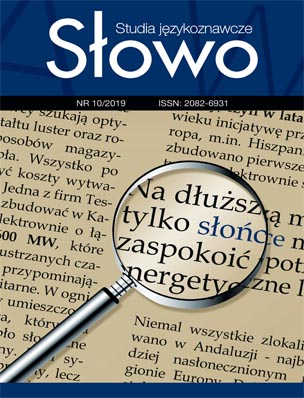Czas dziki żwawiec – analiza semantyczna wybranych czasowników ruchu w przysłowiach o czasie
DOI:
https://doi.org/10.15584/slowo.2019.10.06Słowa kluczowe:
movement verbs, typological and functional analysis, proverb, timeAbstrakt
The text provides a typological and functional analysis of the movement verbs expressed in the texts of proverbs the subject of which is time–an abstract metaphorical concept. Thestudy is based on the semantic frame paremic analysisin which time is featured as an object capable of moving. These are figurative representations of movement, which are the exponents of the fictitious movement. It has been shown that the components of the scenery created by the environment (embodied as water, air, alleged surface of the nose), direction of movement (segmental, horizontal, vertical), and method of contact with the surface are the constants in the semantic frame of such descriptions of displacement. The result of the ongoing research is the conclusion that time is conceptualized by humans as a dynamic concept, associated with movement (even equated with change), which clearly illustrates the current belief that Time does not stand still.Downloads
Bibliografia
Aureliusz Augustyn z Hippony, 1987, Wyznania, przeł. Z. Kubiak, Warszawa.
Bogusławski A., 1988, Język w słowniku, Wrocław.
Burzyńska B.A., Libura A., 2000, Obraz czasu w języku potocznym i naukowym [w:] Język a Kultura, t. 13: Językowy obraz świata i kultura, red. A. Dąbrowska, J. Anusiewicz, Wrocław, s. 131–141.
Doroszewski W. (red.), 1958, Słownik języka polskiego, t. 1, Warszawa.
Dubisz S. (red.), 2008, Uniwersalny słownik języka polskiego, Warszawa.
Gazda G., Tynecka-Makowska S., 2006, Słownik rodzajów i gatunków literackich, Kraków.
Grzmil-Tylutki H., 2011, Gatunek jako kategoria społecznojęzykowa [w:] Gatunki mowy i ich ewolucja, t. IV: Gatunek a komunikacja społeczna, red. D. Ostaszewska przy współudziale J. Przyklenk, Katowice, s. 33–43.
Herbut J. (red.), 1997, Leksykon filozofii klasycznej, Lublin.
Kant I., 1957, Krytyka czystego rozumu, przeł. R. Ingarden, Warszawa, s. 108–112.
Kolberg O., 1967, Dzieła wszystkie. Przysłowia, t. 60, Wrocław–Poznań.
Kowalikowa J., 2001, Przysłowia jako komunikaty [w:] Język w komunikacji 2, red. G. Habrajska, Łódź, s. 112–117.
Krauz M., 2014, Językowy obraz przyjaźni w przysłowiach [w:] Język nasz ojczysty. Zbiór studiów, red. B. Taras, Rzeszów, s. 135–149.
Krzeszowski T.P., 1960, Aksjologiczne aspekty semantyki językowej, Toruń.
Krzyżanowski J., 1969, Nowa księga przyłów i wyrażeń przysłowiowych polskich, t. 1, Warszawa.
Kubiszyn-Mędrala Z., Polskie bezprzedrostkowe czasowniki ruchu w perspektywie semantyki kognitywnej, http://celta.paris-sorbonne.fr/anasem/papers/Motion/CzasRuch.pdf [dostęp 11.10.2018].
Lakoff G., Jonson M., 2010, Metafory w naszym życiu, przełożył i wstępem opatrzył T.P. Krzeszowski, Warszawa.
Małek J., 2012, Paremiologia familijna – językowy obraz relacji zachodzących między żoną a mężem [w:] Parémie národů slovanských VI , Ostrawa, s. 116–127.
Mosiołek-Kłosińska K., 2003, Wstęp [w:] Przysłowia polskie i obce, Warszawa, s. 5–23.
Sawicka G., 2006, Co czas robi z językiem? [w:] Język a Kultura, t. 19: Czas – język – kultura, red. A. Dąbrowska, A. Nowakowska, Wrocław, s. 11–32.
Skoczylas-Krotla E., 2010, Obraz rodziny w przysłowiach różnych narodów, „Prace Naukowe Akademii im. Jana Długosza w Częstochowie”, Seria Językoznawstwo, 2010, z. VII, s. 155–163.
Słownik języka polskiego PWN, wydanie elektroniczne: http://sjp.pwn.pl/szukaj/przys%C5%82owie.html.
Smyk K., 2014, Obraz drogi we współczesnych piosenkach popularnych [w:] Język nasz ojczysty. Zbiór studiów, red. B. Taras, Rzeszów, s. 188–207.
Stephen H.W., 1996, Krótka historia czasu, przeł. P. Amsterdamski, Poznań.
Szpila G., 2000, Skamielina czy żywy organizm – przysłowie w prasie polskiej [w:] Język trzeciego tysiąclecia. Język a komunikacja 1, red. G. Szpila, Kraków, s. 214–224.
Szpila G., 2002, Minimum paremiologiczne języka polskiego – badanie pilotażowe, „Język Polski”, LXXXII, z. 1, s. 36–42.
Szpila G., 2003, Krótko o przysłowiu, Kraków.
Szpila G., 2005, O potocznym definiowaniu przysłowia [w:] Język trzeciego tysiąclecia III. Tendencje rozwojowe współczesnej polszczyzny. Język a komunikacja 8, red. G. Szpila, Kraków, s. 85–91.
Szymczak M. (red.), 1981, Słownik języka polskiego, Warszawa.
Tatarkiewicz W., 2011, Historia filozofii, Warszawa.
Waliński J.T., Warunek instrumentu dla wyrażeń ruchu fiktywnego, https://www.researchgate.net/publication/282504656_Warunek_instrumentu_dla_wyrazen_ruchu_fiktywnego [dostęp 11.10.2018].
Węgiel M., 2012, Co ma Nike do przysłowia czyli proverbia we współczesnych tekstach literackich, „Język Polski”, XCII, z. 4, s. 269–276.
Wójcicka M., 2014, Struktura tekstu ustnego jako odwzorowanie struktury pamięci [w:] Język nasz ojczysty. Zbiór studiów, red. B. Taras, Rzeszów, s. 36–50.
Wyżkiewicz-Maksimow R., 2001, Funkcje przysłów w procesie komunikacji [w:] Język w komunikacji 2, red. G. Habrajska, Łódź, s. 118–123.
Wyżkiewicz-Maksimow R., 2012, Językowy obraz człowieka – charakter i osobowość w paremiologii polskiej, serbskiej i chorwackiej, Gdańsk.
Ziomek J., 1990, Retoryka opisowa, Wrocław.
Pobrania
Opublikowane
Jak cytować
Numer
Dział
Licencja
Prawa autorskie (c) 2019 Słowo. Studia językoznawcze

Utwór dostępny jest na licencji Creative Commons Uznanie autorstwa – Użycie niekomercyjne 4.0 Międzynarodowe.


